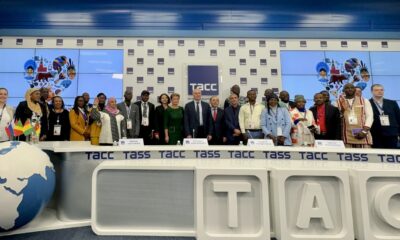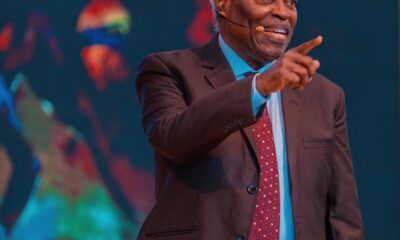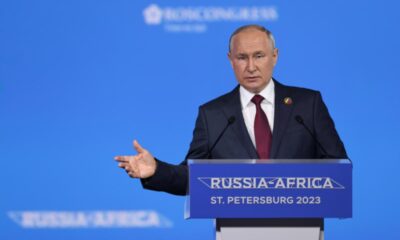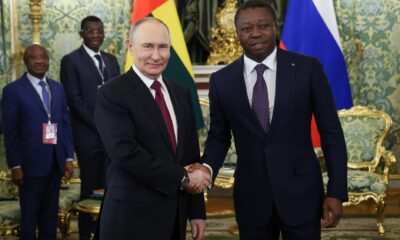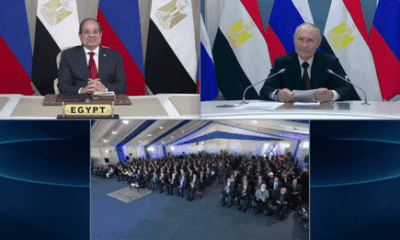Forgotten Dairies
Great-Power Rivalry Reawaking Russia to Realities in Africa -By Kestér Kenn Klomegâh
Chairman of the State Duma, Vyacheslav Volodin, meeting with African ambassadors, indicated clearly that Russia is competing with foreign players in Africa, but as Russia continues invariably working on its long-term cooperation, it has “to move away from intentions to concrete steps.” Russia has a distinctive feature in comparison with other countries: it has always spread to the people of the African continent good things, solutions of the development problems.
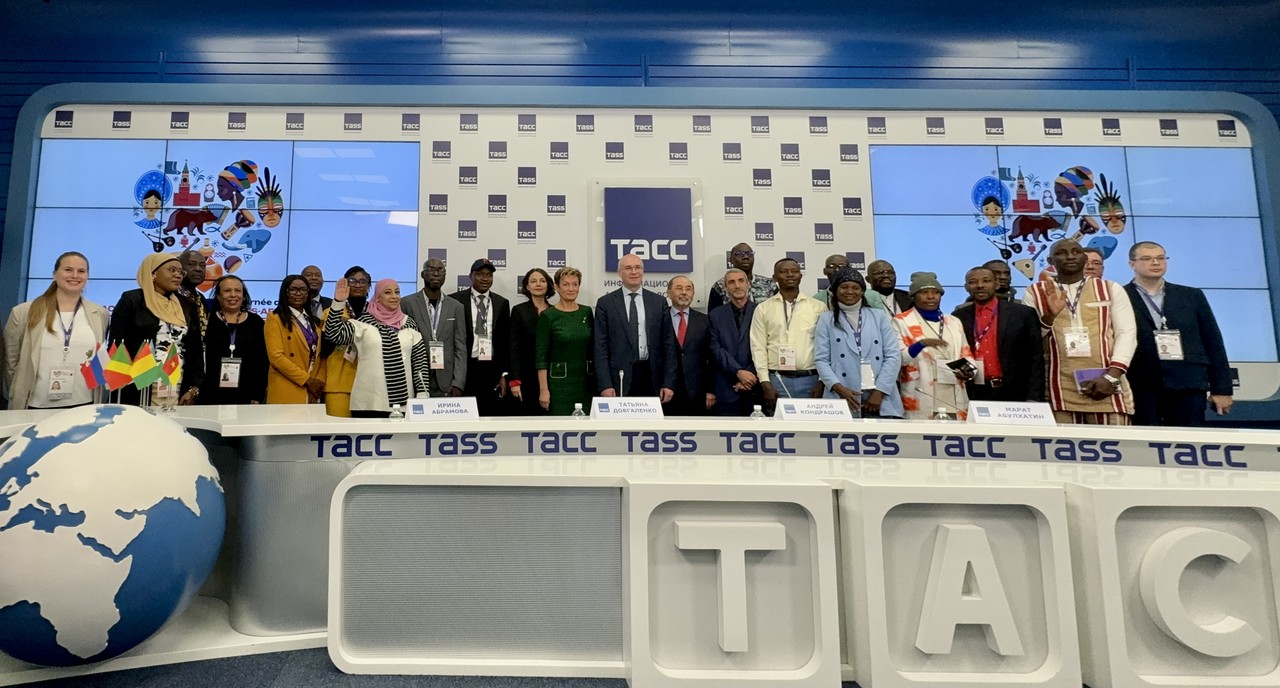
With heightening geopolitical situation, a new wave is entirely blowing from Russia to Africa, fortifying the emerging multipolar world with emphasis on Africa and the Global South. Russia’s policy approach to Africa is increasingly changing, incorporating most the areas and spheres as ready instruments for consolidating the scale of current relations. For the first time in the post-Soviet history, a press tour for journalists of African news agencies “TASS – Africa: the Path of Friendship” took place from November 16 to 24 in Moscow, Kazan and St. Petersburg.
The TASS news agency intends to establish news bureaus in all African countries, replicating its presence during the Soviet era, Director General Andrey Kondrashov said. His statement was based on the fact that Africa is becoming “one of the most important areas of focus.” The biggest challenge is how to create an extensive outreach and maintain a significant information footprint, a replica which was witnessed during Soviet times.
Chairman of the State Duma, Vyacheslav Volodin, meeting with African ambassadors, indicated clearly that Russia is competing with foreign players in Africa, but as Russia continues invariably working on its long-term cooperation, it has “to move away from intentions to concrete steps.” Russia has a distinctive feature in comparison with other countries: it has always spread to the people of the African continent good things, solutions of the development problems.
During the meeting, the issue of greater representation of Russian media in Africa was raised, and the ambassadors responded with applause. “It is necessary to take certain steps together for the Russian media to work on the African continent,” Volodin noted before arguably comparing that “the Russian media provide broadcasting in various languages, they work in many countries, although it is certainly impossible to compare this presence with presence of the media of the United States, United Kingdom and Germany.”
Notwithstanding the geopolitical obstacles, Russia has sound instruments for media cooperation. Yet, officials desperately complain over anti-Russian media campaign perpetuated by the western media in Africa. The continent’s biggest challenge among political elite and entrepreneurs is to access opportunities in the Russian Federation for cooperation, yet these vital element has been missing. There is dearth of information on economic and tourism developments between Russia and Africa.
For creating a sustainable partnership—the first in Africa—would require sprawling educational campuses, frequent exchange of specialists and students, promoting visa-free tourism, as well as media practitioners’ engagement with ordinary Russians, visiting interesting tourism spots across the Russian Federation.
And while China, for instance, has granted 53 African nations duty-free access to its market, Russia would simply not just as it does consider it necessary to permit African reporters inside the country. Noticeably, Africans are showing high interest in leveraging their relationships with Russia. On the other side, Russian rules and regulations are restricting Africans, and as result, rather continue balancing their strategic relationship—with varying degrees of success with the United States and Europe.
Experts have consistently argue that lack of two-way media representation exacerbates misunderstandings between Russia and Africa. As a result, African leaders and corporate business executives often rely on Western media for information about Russia, leading to a one-sided view that often reflects Western biases. As Africa’s middle class continues to grow, representing a vibrant information market, the need for a balanced and comprehensive media coverage from both sides becomes increasingly crucial. The low representation does not reflect the growing diplomatic and economic ties between Russia and Africa. Analysis further shows both realism and symbolism, and Africa repetitive attempts to turn symbolism into real substance at this stage of shifting developments.
Artem Kozhin, now Ambassador to Seychelles. During the Russia-Africa Summit, Artem Kozhin, who represented the Foreign Ministry’s Information and Press Department, at the panel discussion on media, explained in an indepth report that some 300 news bureaus from 60 countries were operating in Russia, including 800 foreign correspondents and 400 technical personnel in the Russian Federation. According to his interpretation, this extremely low representation of African media hardly meets the level of current dynamically developing relations between Russia and Africa. “We invite all interested parties to open news bureaus and expand media cooperation with Russia,” Kozhin said at the gathering, inviting Africa media to Moscow.
Professor Alexey Vasiliev, the first Special Representative of Russian President for Relations with Africa (2006-2011) and currently the Head of the Center for African and Arab Studies at the Peoples’ Friendship University of Russia, told the audience in Sochi: “Africa is largely unaware of Russia, since African media mainly consumes information the Western media sources and then replicates them. And all the fake news, the Rusophobia and anti-Russian propaganda, spread by the western media, are repeated in the African media.”
“Measures are needed to enable us to better understand each other,” suggested Professor Vasiliev, who regularly advises the Presidential Administration, the Government of the Russian Federation, both chambers of the Federal Assembly, and the Russian Foreign Ministry.
Critiques has since emerged regarding the level of discrimination in accrediting foreign media. In a parallel plane, policy researchers say Africa’s media absence in the Russian Federation is alarming. In short, Africa Studies Institute’s Director, Professor Irina Abramova has reiterated at several conferences including the State Duma, and now at TACC conference with the media group from 10 Francophone African countries, the extremely low, better still no African media presence in the Russian Federation.
She emphasized that Russia’s image is formed by African audiences, influenced by the media, often diverges significantly from reality. The director noted that receiving first-hand information is the foundation for mutual understanding and cooperation. “Information, today, has become a powerful productive force, capable of shaping objective reality. Under the current conditions, the role of journalists is extremely important, because the nature of Russian-African relations, largely depends on how given facts are presented,” Professor Abramova stated, while urging African media practitioners to actively establish their presence in the Russian Federation.
Professor Abarmova regrettably underlined that not a single African news agency has permanent accreditation in the country. The speakers discussed expanding cooperation in the information sphere, pointed to the importance of expanding Russian media offices on the African continent.
For decades, cooperation with Africa has been in line with Moscow’s policy aimed at strengthening media ties. And now, by inviting these African media practitioners, more or less, marked one step toward teaming up, at starting level, to fight anti-Russian propaganda, and the spread of fake information. In addition, Professor Abramova underscored the critical fact that the Africa Department, Ministry of Foreign Affairs, has to work up to an appreciable expectations, discard uncollaborative approach (preferring uncoordinated) to issues relating to Africa.
For Africa, officials of the Department for Partnership with Africa at the Russian Foreign Ministry should rather show enthusiasm in facilitating the rules and regulations, among others, in addressing promptly the necessary obstacles hindering bilateral media cooperation. Professor Abramova unreservedly suggested, for example, the significance of establishing Russia-Africa Press Exchange Programme to encourage and promote exchanges and regular visits between Russian and African media.
Tatyana Dovgalenko, Director of the Department for Partnership with Africa at the Russian Foreign Ministry, said that Moscow counts on the active participation of its partners from Africa. In this context, she reiterated the Russia-Africa summits held in October 2019 and July 2023, have described as a true breakthrough by Russian President Vladimir Putin. “These events served as a powerful starting-point for what is commonly referred to as the revival of Russia-Africa relations. And today, Russian-African ties are steadily growing,” Dovgalenko said at the conference dedicated to the launch of the press tour. “It is important that our African friends view Russia as a reliable friend and a partner, capable of acting to protect its own sovereignty and supporting others to do the same.”
“These events served as a powerful starting-point for what is commonly referred to as the revival of Russia-Africa relations. And today, Russian-African ties are steadily growing,” Dovgalenko said at the conference dedicated to the launch of the press tour. “It is important that our African friends view Russia as a reliable friend and a partner, capable of acting to protect its own sovereignty and supporting others to do the same.”
The media initiative was as a follow up to Foreign Minister Sergey Lavrov’s discussions about rolling out a comprehensive roadmap for a more integrated cooperation and to find ways of improving public diplomacy in Africa.
On May 16, Sergey Lavrov chaired the Foreign Ministry Collegium meeting on the theme titled “Concept of the Russian Federation on Cooperation with African Media” which stresses the need to cooperate with African media as Russia looks forward to strengthening relations and intends to share its strategic interests with Africa. According to the MFA report: “the Russian Federation is implementing programmes of cooperation with various African countries which include the media, education, culture, art, and sport.”
In order to overcome these challenges mentioned above in the article, both Russia and Africa have to take concrete steps toward building a more collaborative media landscape. This includes creating opportunities for African journalists in Russia and increasing the presence of Russian media in Africa. In mid-November 2025, media representatives invited from 10 Francophone African countries, visited key landmarks, museums, and universities, and held meetings with representatives of academic institutions and media.

